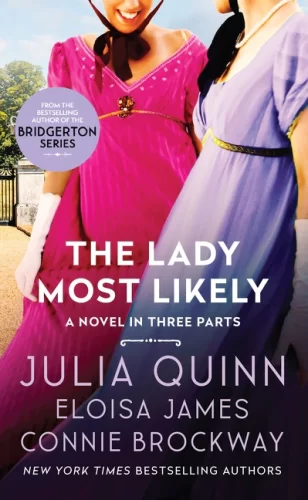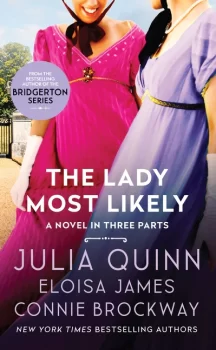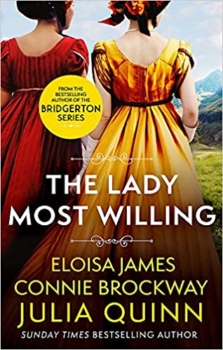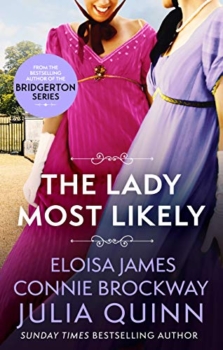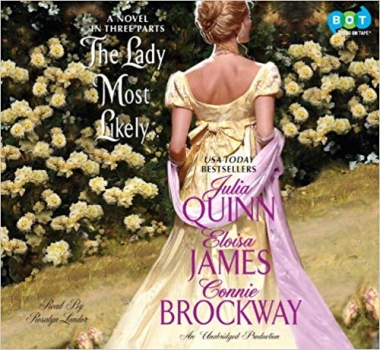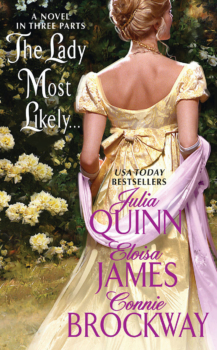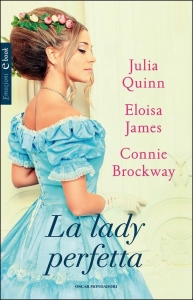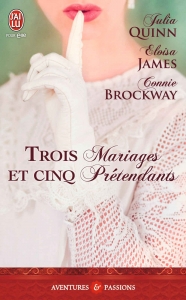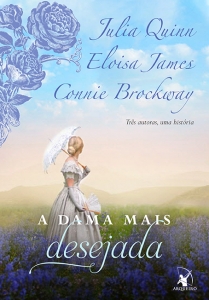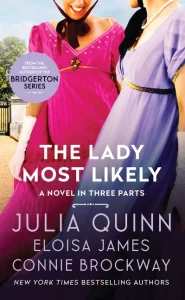The Lady Most Likely…
Book 1 in the
Ladies Most
Hugh Dunne, the Earl of Briarly, needs a wife—so his sister hands him a list of the very best young ladies on the market. And then, because he refuses to tear himself away from the stables where he trains Arabian racehorses, she invites all those ladies to a house party, along with some other bachelors, of course. So who will Hugh choose?
The Botticelli-esque, enchanting Gwendolyn Passmore? The outspoken, delightful Kate Peyton? If he doesn’t work fast, he’ll lose those ladies to the Earl of Charters or Captain Neill Oakes, and then where will he look for a wife? Perhaps, just perhaps, toward a lady who’s not on a market at all, and would require a great deal of persuading…
From Julia Quinn, the author of Bridgerton—along with close friends and bestselling authors Eloisa James and Connie Brockway—comes an enchanting tale of a country house party in which three heroines find their happily ever after! And You’re Invited!
 Start Reading Now
Start Reading Now
 Explore Inside this Story
Explore Inside this Story

Books in this series:
Find out more about the Ladies Most →
-
Quinn-tessential Quote
"I believe in love at first meaningful conversation."
-
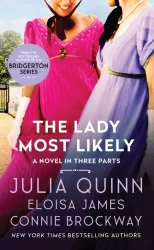
Inside the Story:
JQ’s Author Notes- When Eloisa James, Connie Brockway, and I decided that we were going to collaborate on a novel in three parts, we knew that we would need to get together to plot the book and develop the characters. So we took a fabulous long weekend to New Orleans—we got a ton of work done (and gained about six pounds—each!)
- The original title for The Lady Most Likely... was The List. Eventually we decided that even though it fit the book very well, it wasn't very interesting, so we changed it.
- Alec's name was originally Marcus. I changed it because I realized that I'm running out of good hero names. Since I already had an Alex (in Splendid), I figured I was unlikely to use Alec for a full-length novel. I ended up using Marcus as the hero's name in Just Like Heaven.
- Gwendolyn is often compared to Botticelli's Venus in his seminal painting The Birth of Venus.
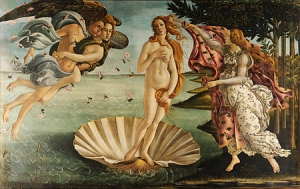
Public domain as per Wikipedia. - Gwendolyn's mother makes up an impromptu song called, "A House Party La La La." This was inspired by "A Weekend in the Country," from the Stephen Sondheim musical A Little Night Music.
- Eloisa James named the local village Parsley, so naturally I had to name the inn The Sage and Thyme. There is no mention of an innkeeper, but I am sure his wife is named Rosemary.
- I loved the Duke of Bretton's dry sense of humor so much in The Lady Most Likely... that when we decided to team up again for The Lady Most Willing..., I quickly claimed him as my hero. He is the only connection between the two collaborations, though.
-

Bonus Features
Enjoy an Excerpt
from
The Lady Most Likely…
When Gwendolyn Passmore was eighteen, she slipped on a muddy lane and broke her leg. The doctor did a splendid job setting the bone, but Gwen was required to stay off her feet for eight full weeks. Normally, this would have been utter torture. Gwen was a walking sort of girl; she loved nothing more than to slip out of the house when the dew was still fresh on the grass and walk for miles and miles, until the hem of her dress was soaked.
But she broke her leg in April, which meant that she had to forgo what was to be her first London season. Her mother was devastated.
Gwen was ecstatic.
When she was nineteen, her brother was killed at Waterloo. The family went into mourning, and Gwen’s season was postponed by another year.
Gwen had got to do all her lovely, long walks that spring and summer, but half the time she found herself sitting under a tree, crying. Her brother Toby had been the only person in the world with whom she had felt completely at ease. And now he was gone.
When Gwen was twenty, she broke no bones, and no one died, and so in late March, she found herself being measured and poked and fitted and examined, and then she was taken off to London where she was measured and poked and fitted and examined by women with French accents (which somehow made the experience remarkably different although no less miserable).
As her parents were the Viscount and Viscountess Stillworth, she received invitations to every important party, and on one chilly night in April, she was trotted out before the ton to make her debut.
To her horror, she was an instant sensation.
“I told you she looked like Botticelli’s Venus,” her mother said proudly to her father, after a fourth gentleman had commented on the resemblance. And indeed, with her wavy titian hair, alabaster skin, and sea green eyes, Gwen did bear a striking resemblance to the goddess as interpreted by the Italian master.
But each time someone commented on it, she could do nothing but stammer and blush, because she knew as well as all the rest of them that Venus was standing in her clam shell with her hair covering only one breast.
And so, less than a week into the season, Miss Gwendolyn Passmore was heralded the undisputed beauty of the ton. Sonnets were composed in her honor, the newspapers had taken to calling her Venus of London, and she had been asked to sit for a portrait by Sir Thomas Lawrence himself.
Gwen’s mother was ecstatic.
Gwen was miserable.
She hated crowds, hated having to talk with people she did not know. She did not enjoy dancing with strangers, and the mere thought of being at the center of anyone’s attention was terrifying.
She spent a great deal of time standing in corners, trying not to be noticed.
Her mother was forever telling her to, “Smile! Smile a bit!” and “Be more cheerful!” Gwen wanted to please her parents, and she would have loved to have been one of those girls who laughed and flirted and was the life of every party.
But she wasn’t.
By June, Gwen was counting the days to the end of the season. In July she gazed at her calendar, thinking–so close, so close. And then August (so tantalizing), and September, and–
“I have wonderful news!” her mother exclaimed, rushing into her room.
Gwen looked up from her sketchpad. She wasn’t terribly good at drawing, but she liked to do it nonetheless. “What is it, Mama?”
“We have been invited to a house party!”
Little fingers of dread began to uncurl in her belly. “A house party?” Gwen echoed.
“Indeed. We have been invited by the Marchioness of Finchley. Isn’t that splendid? It is to be two weeks hence.”
“I thought we were going home next week.” It did not matter that the London residence bore her family’s name; to Gwen, home would always be Felsworth, the huge, rambling estate in Cheshire where she’d grown up.
“Finchley Manor is in the Yorkshire Dales. It is almost directly on our way to Felsworth,” her mother explained. “We shall stop off on the way. It will be a lovely diversion. So nice to break up the journey.”
The journey wasn’t so long as to require breaking up by anything more than a few nights at inns, but Gwen didn’t bother pointing this out. Nor did she ask how, exactly, Yorkshire was on the way to Cheshire. There was nothing to be gained by it; her mother had made up her mind and there would be no budging her.
A house party, Gwen thought miserably. She supposed it couldn’t be worse than a London season.
“Lady Finchley writes that Bretton will be there,” her mother said, holding up the letter as if it were a legal document. “I do think we have him close to proposing, Gwennie. This may be our opportunity to bring him up to scratch.”
It was at times like these that Gwendolyn wondered if she and her mother inhabited the same world. Because in her world, it was quite obvious that the Duke of Bretton wasn’t anywhere near to proposing marriage. Although she would probably say yes if he did. She rather fancied being a duchess. As far as she could tell, duchesses got to do anything they wished.
It might be rather entertaining to be an eccentric.
And the duke seemed pleasant enough. Quite handsome, and terribly intelligent.
“I shall have to write to Lady Finchley to see who else is coming,” Gwen’s mother said, her eyes taking on a terrifying strategic gleam. “Perhaps her brother–he is Lord Briarly, you know.”
Gwen knew. She had memorized DeBrett’s. It made talking to people a bit easier, knowing who they were and how they were all connected.
“I wonder who else,” her mother mused. “I cannot think of who Lord Finchley is friendly with. Although one would think it is his wife who is composing the guest list.” She leaned forward and patted Gwen’s hand. “I know you don’t like these things, darling, but this won’t be so terrible, I promise. A house party is much different than London. It’s much more intimate. By the end, you shall be great friends with everyone.”
Based on her experience with the young ladies of the ton thus far, Gwen thought tartly, she highly doubted it. She looked down at her sketch pad. She’d been drawing a rabbit. She decided to give him unpleasant teeth. Vicious little bunny. Excellent.
“Now then,” her mother continued, “we shall have to get you a new riding habit, and perhaps three new day dresses as well. And oh, I am just so so pleased that Lady Finchley thought of this. I am so grateful for this last opportunity for you to meet a few gentlemen.”
“I’ve met all the gentlemen,” Gwen insisted. It was true. She’d been introduced to every gentleman in London. She’d danced with most of them, and she’d received offers of marriage from four. Two had been rejected out of hand by her father, one had been nixed by her mother (“I know his mother,” she had said, “and there is no way I am subjecting my only daughter to that.”), and the last–Lord Pennstall–she had almost accepted.
He had been very kind, and he was rather handsome, too, and only eight years her senior. There had been nothing wrong with him at all–until she found out that he wished to make his primary home in London. He was very interested in governmental issues, even extending beyond his seat in the House of Lords.
Gwen just couldn’t do it. The thought of spending the rest of her life in London, acting as his hostess, throwing parties and arranging salons–it was unbearable.
And so with some regret, she declined, explaining her reasoning to Lord Pennstall. (She could not imagine refusing an offer of marriage with anything less than complete honesty.) He had been disappointed, but he understood.
Gwen knew that this meant she would have to endure another season, unless she somehow managed to find the perfect husband back home. Still, one more season in London was infinitely preferable to a lifetime as a political wife.
But she’d thought she had earned a break. She’d thought she’d be free of this for another year. She looked over at her mother, who had apparently just composed a song called “A House Party La La La.”
Freedom, it seemed, would be delayed.
Alec Darlington had been the Earl of Charters for two years, but he still had not grown used to the name. “Charters” was his father, a gruff and strict old man who had never met a bit of his son with which he did not find fault. Alec had always enjoyed being “Darlington.” It was a roguish, devil-may-care sort of name, perfectly suited to a man who spent his life in the pursuit of pleasure.
Alec had enjoyed living up to his name when he was Darlington.
Charters, on the other hand, was a dull. Charters made charts. Looked at ledgers. Acted responsibly.
And it wasn’t so much that he wished to be irresponsible again. He’d simply have liked the option of it.
But the carriage accident that had taken his father had also taken his mother, whom Alec had deeply and honestly mourned. And Alec had quite suddenly found himself entrusted with the care of his two younger sisters. He’d got Candida married off the year before, to a well-connected second son who worshipped the ground she walked upon. All in all, it had been a most satisfying arrangement.
This left Octavia, who at twenty had just completed her second season with nary a proposal, despite the perfectly respectable dowry he’d settled upon her. She’d done everything right, or so their great aunt Darlington (who had acted as chaperone) had told them. Her clothing had been from the finest of modistes. She danced like an angel. She could sing, and draw, and paint watercolors. In short, she could do everything a young lady of her birth was supposed to do.
But for whatever reason, she did not “take.”
Maybe she wasn’t ravishingly pretty, but he did not think she was plain. Her teeth might be a bit prominent, but that was all, really. And her eyes were quite lovely, the same color as his, actually–a clear, crisp gray. He’d certainly received compliments on his eyes. Why the hell didn’t Octavia?
The men of London were a pack of idiots. It was the only explanation Alec could think of.
“Do you know who will be in attendance?” Octavia asked him. They were in his carriage, nearly to the end of the long drive that led to Finchley Manor.
“Briarly, of course,” Alec said, peering out the window. He’d never been to Finchley despite his longstanding friendship with Hugh. “The marchioness is his sister.”
Octavia nodded. “Yes, but I can hardly set my cap for him. He’s practically my brother.”
Alec nodded absently. “I’m sure Carolyn has assembled quite a guest list. She’s very thoughtful about these things.”
Octavia sighed. “It’s just that–Oh no!”
“What is it?”
She let out a beleaguered breath. “Look,” she said, jerking her head toward the window.
Alec looked out but so nothing out of the ordinary. Just another carriage at the entrance to the house, depositing its owners–a young woman and her parents, from the looks of it.
“You don’t see her?”
“Who?” he asked.
“Gwendolyn Passmore,” she groaned. “This is the worst news imaginable.”
“What’s wrong with Gwendolyn Passmore?”
“Alec, no one will even so much as look at me if she is in the room.”
Alec had been introduced to Gwendolyn Passmore once or twice, and he had to admit, she was rather amazingly beautiful. Still, Octavia was his sister, and so he said, “Don’t be ridiculous. I can think of a thousand reasons why a gentleman would rather spend time with you.”
“Oh, really,” she said. “A thousand. Do tell.”
He groaned inside. Sisters and sarcasm were a lethal combination. “You have much more personality,” he said.
She looked stricken.
“What did I say?”
“That I have personality?” she nearly cried. “Don’t you know that’s what gentlemen always say about the ugly girls?”
“I never said you were ugly!”
“You didn’t have to,” she sniffed.
He stared at her for a moment, then said, “I just want to verify that there is no correct statement I could make at this point, yes?”
She gave him a grudging nod.
This, Alec thought, was why he was not married. Clearly a man could manage dealings with only one female at a time. He couldn’t even consider taking a bride until he had his sister off his hands.
He shook his head, then put his hand on the door handle. They had come to a stop, and he was eager to hop down and stretch his legs.
“Don’t!” Octavia said, yanking his hand back.
“What is it now?”
“Wait until she goes inside.”
He looked outside. “Miss Passmore?”
“Yes.”
He looked outside again. “Is she that bad?”
“I don’t want to walk in beside her.”
“For heaven’s sake, Octavia.”
“I shall look like a pudgy little hen next to her.”
“Oh, for the love of–”
“And,” Octavia added with great emphasis, “she’s very standoffish. If I had been declared the pearl of the season, I would be a great deal more friendly to the other young ladies.”
Alec took a breath. He didn’t want his sister to feel uncomfortable, but this was ridiculous. And uncomfortable. For him. He’d been in the bloody carriage for four hours. He wanted to stretch his legs. “I will count to ten,” he said. “If she is not inside by then, I am getting out.”
“Please, Alec. For me?”
Luckily for both of them, Miss Passmore entered the house when Alec reached nine, and he did not have to force the issue. But still, he could not walk with anything approaching his normal speed. Octavia clamped her hand on his elbow with what had to be superhuman strength and then positively bolted her feet to the ground.
“Now what?”
“Give her time,” she ground out.
“You would prefer to stand out here like a lackwit than cross paths with Gwendolyn Passmore?”
From Octavia’s expression, the answer was clearly yes, but she must have had some pride, because she allowed him to nudge them forward at the same pace he’d used when he’d given Candida away at her wedding the previous year.
“I am beginning to realize,” Alec murmured, “why people always hope for sons. It has nothing to do with producing an heir.”
“That was unkind,” Octavia said, not sounding the least bit insulted.
“Females are a prodigious amount of work.”
“I’m told that we’re worth it.”
This time Alec halted in his tracks. “Who told you that?”
Octavia opened her mouth to speak, but before she could make a sound, he said, “What the devil has Candida been telling you?”
“We haven’t a mother, you know,” Octavia said primly. “Someone must explain to me how things are done.”
Alec felt his whole world drop by two inches. Or maybe it was just his belly. He felt ill. Exhausted. “She was supposed to wait until you married,” he grumbled.
“Sisters don’t have secrets,” Octavia said gaily, and then she sailed inside with a wide smile on her face. Alec was impressed. She gave no sign of her recent distress.
Lady Finchley was waiting in the foyer, greeting her guests with a basket of scones.
“Carolyn,” Alec said, giving her a polite bow and a sly smile. “You look positively pastoral.”
“Don’t I?” She held up the basket as if displaying a costume. “Everyone has been in town for so long. I thought it only right to be as rustic as I could. We are here to celebrate fresh clean air and morning dew and all that, aren’t we?”
“Do I have to awaken in time to enjoy the dew?”
“Absolutely not,” Carolyn assured him.
“Then I agree completely.”
She gave him a smile that was really half-smirk. “You need a wife.”
“You are not the first to say so.”
Her brows rose, and then in flash she dismissed him with a wave, turning to his sister with a grand smile. “Octavia Darlington,” she said, with enough delight that one would think they hadn’t seen each other just one week prior. “How nice to see you!”
“Thank you for inviting me,” Octavia said, bobbing a polite curtsy.
Carolyn leaned in and spoke in a conspiratorial voice, although it was difficult to understand why, as Alec was the only other person nearby, and he could hear perfectly well. “I have invited many eligible young gentlemen,” she said to Octavia. “You, my dear, are going to have a splendid time.”
She turned back to Alec, one of her brows arching in question. “I’m told you were in London for the season, but I hardly saw you.”
“He pawned me off on Great Aunt Darlington more often than not,” Octavia said with a grin.
“Well, don’t tell Hugh,” Carolyn said to Alec. “I told him you took Octavia everywhere.” To Octavia she added, “I needed to make him feel guilty about something. I do hope you don’t mind.”
“Not at all,” Octavia said, clearly pleased to have been included in Carolyn’s subterfuge.
“Now then,” Carolyn said, clearly ready to move on, “Where is Great Aunt Darlington?”
“She was delayed in London,” Octavia explained. “Her bimonthly meeting of the Society of Bird Collectors was the day we left. She’ll be along this evening.”
“She collects birds?”
“You should ask her about it sometime,” Alec said.
“Don’t,” Octavia put in, flashing him an aggravated look. “Not unless you really want to hear about it.”
“I confess to a curiosity…”
“She stuffs them,” Alec said.
“She does not,” Octavia exclaimed. She looked at Carolyn. “He is a nuisance. A blight on society.”
Carolyn laughed. “Brothers often are. I tell you, I don’t know what to do with Hugh these days.”
“Is he here yet?” Alec asked. He hadn’t seen his good friend in months.
“In the stables,” Carolyn said.
“Of course.”
“Of course.” She rolled her eyes, then slid back into her role as hostess. “Winters here will show you to your rooms. Octavia, I’ve put you with Great Aunt Darlington. The room is exceedingly pink. I hope you don’t mind. Alec, you’re off near Hugh.” She gave a little wave of her hand as if to indicate some specific portion of the massive house.
“I believe I’ll go find Hugh,” Alec said. He looked over at Octavia. “You’ll be fine without me?”
Octavia looked peeved that he would embarrass her with such a question in front of Carolyn. “Of course.”
“There is already a small group of young ladies gathered in the west salon,” Carolyn said. “Gossip abounds.”
Octavia grinned. “Then I shall proceed there directly.”
“And I shall make my escape,” Alec said, wondering if there existed any greater nightmare than a pack of young ladies in one room, engulfed in a cloud of gossip. Luckily for him, he would not have to find out. He headed back outside, striding across the drive toward the stables. It would be good to see Hugh again. They had been fast friends in college and then at university, but after that, their meetings had been sporadic. Alec was more often than not in town, and Hugh was, more often than often, wherever his horses were. Which wasn’t usually in town.
Alec hummed to himself as he approached the massive stables. The smell of hay and manure wafted toward him on the breeze, and he smiled, even as eau de sweaty horse mixed itself into the scent. He liked riding just as well as the next man, and he’d certainly run in his fair share of races and hunts, but he’d never quite understood the passion for horseflesh that gripped Hugh. Still, he liked that Hugh liked it. He wouldn’t be the same if he weren’t so cowheadedly obsessed with his cattle.
“Hugh!” Alec called out, pushing open the door. He heard a whinny from a rear stall, followed by an expletive. Followed by another whinny, which he assumed was the horse’s version of an expletive.
“Hugh?” he called again.
A head popped out from the stall. “Darlington,” Hugh said. “Good to see you.”
“And you.” Alec didn’t bother to correct him about the name. He rather liked that Hugh still called him Darlington. There was something lovely and familiar about it, as if they were boys again, their only responsibilities to their tutors and their friends. He walked closer and peered in. “Is this the stallion that has half of London aflutter?”
“The intelligent half,” Hugh answered.
“Robespierre?”
“Richelieu.”
“Of course,” Alec murmured.
Hugh got back to work, which was– well, quite honestly Alec wasn’t sure what he was doing, but the horse didn’t seem to like it. Alec took a step back. He’d seen men kicked by horses before. He did not aspire to the experience.
“What are you doing here?” Hugh asked, not looking up.
“You invited me.”
“Eh?”
“Your sister. By extension, you.”
At that his friend raised his head and gave him a frank stare. “Will our sisters ever not be, by extension, us?”
“I don’t think so,” Alec said regretfully.
Hugh pressed his fingers to his temples, an action Alec would not have endorsed, considering the state of his gloves. Still, the poor man did look as if he was battling a ferocious headache. “One more,” Hugh said. “One more to get married off, and then I’m done.”
Alec thought of Octavia, off gossiping with her brethren. “We shall have a party, you and I.”
“Do you ever think of taking a bride?” Hugh asked.
Alec blinked at the surprising turn of the conversation. It was damned odd. Men didn’t talk about marriage. Not the way women did. “Er… No?”
“You’ll have to eventually, won’t you?”
“Well, yes.” But not yet. What the devil had got into him?
Hugh let out a sigh. Or maybe a groan. “I’ve been thinking of taking one on myself.”
“A wife?” Alec asked, just to clarify. Taking one on seemed an odd way to phrase it.
Hugh nodded, then jumped back when the horse let out an aggressive snort. “It’s time.”
Was it possible that Hugh needed to find an heiress? He’d not heard of difficulties in the Briarly family finances, but that did not mean they did not exist. Hugh was a private man, and he did not go to town; his estates could be falling apart without anyone knowing a thing about it.
“Is there something you’d like to tell me about?” Alec asked carefully. Something wasn’t quite right about Hugh. He was far too serious. Not that he’d ever been unserious, but this was different. He looked guarded. Worried.
Hugh never worried about anything that wasn’t equine.
“Everything’s fine,” Hugh said with a grunt. “It’s just that I have responsibilities.” He looked up. “As do you.”
It didn’t exactly sound as if Hugh were scolding him, but it felt like it, all the same. Alec paused, lest he reply in a manner he might later regret.
“Don’t look at me like that,” Hugh said, giving him a lopsided smirk. “Where does your title go if you don’t reproduce? You don’t have a brother.”
“First cousin,” Alec said, a bit peeved that Hugh could diffuse his irritation with so reasonable an argument.
“Do you really want that? Mine goes to Simon Carstairs.”
Alec blinked. He knew Carstairs. He wished he didn’t. “You’re related?”
Hugh nodded grimly. “Third cousin.”
Alec considered this. “Your family really does have difficulty producing boys.”
“It’s a problem.”
“Very well, you should marry. Quickly.”
“My sisters call him Slinky Simon.”
Alec chuckled.
“It’s only funny if he’s not your cousin.”
“It’s funny because it’s true.”
Hugh did not look amused. “I had them make me a list.”
Alec stopped chuckling. “What?”
“A list. Of women. I had my sisters make me a list of possible brides. I can’t be expected to figure this out on my own.”
“The rest of us generally do.”
Hugh gave him a powerfully irritated glare. “I’m busy.” He waved an arm toward the stallion, which, Alec had to admit, had calmed down remarkably during the conversation. Whatever it was that Hugh was doing to the beast, it was working.
“Very well.” And then Alec had a provident thought. “D’you want my sister?”
“Octavia!” Hugh gaped at him. “Isn’t she twelve?”
“She’s nineteen.”
“I can’t marry her. I’d keep picturing her as twelve.”
“She doesn’t look twelve any longer, Hugh.”
Hugh shuddered, looking vaguely ill. “All the same. I can’t do it.”
“Damn.” There went a perfectly good husband prospect.
“I’m thinking about Gwendolyn Passmore.”
Alec looked up and let off an exhausted groan. “Double damn.”
“What’s wrong with Miss Passmore? I’m told she’s lovely.”
“You haven’t met her?”
“When would I have met her?” Hugh asked with a shrug.
Alec shook his head. He adored Hugh, but honestly, he was sometimes so far removed from normal British life it was scary. “She’s beautiful,” he said. “Insanely so.”
Hugh cocked his head to the side and tilted the corners of his mouth as if to say, “That’ll do.”
“Octavia hates her,” Alec went on.
“She’s probably jealous.”
“Of course she’s jealous. She admits it freely. But she also says she’s haughty.”
“Miss Passmore?”
Alec gave a nod.
“Damn.” Hugh released a pent-up breath. “I can’t tolerate a snobby female. Ah, well, I suppose I’ll give her a go, anyway. Ought to judge for myself.”
Give her a go. Alec wasn’t so sure Hugh understood the difference between winning a female and taming a horse. “Who else is on the list?” he asked.
Hugh blinked. “Do you know, I can’t remember.”
Alec smiled. There was Hugh for you. “I wish you well with Miss Passmore, then.”
But Hugh was already back to Richelieu, whispering something as he rubbed an ointment into his flank.
A really, incredibly, viciously foul-smelling ointment.
Alec shook his head as he left the stables. He hoped Miss Passmore liked horses.
The Lady Most Likely…
by Julia Quinn, Eloisa James, and Connie Brockway.
is available in the following formats:
Mass Market Paperback:
The United Kingdom:
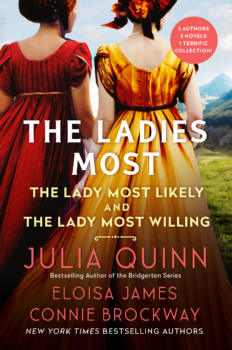
Collections:
Not ready to order yours? Check out this story's overview. Read the excerpt. Listen to a bit on audio. Find out more about the series. There’s so much to love!
Awards & Achievements
- Four weeks on the USA Today bestseller list.
- On the AvonRomance blog, JQ, Eloisa James, and Connie Brockway are contestants on the first (and quite possibly the last) episode of Romance Author Jeopardy!
-
 Debuted at #8 on the New York Times mass market paperback list.
Debuted at #8 on the New York Times mass market paperback list. - A Main Selection of the Rhapsody Book Club and a Featured Alternate Selection of the Doubleday Book Club.
